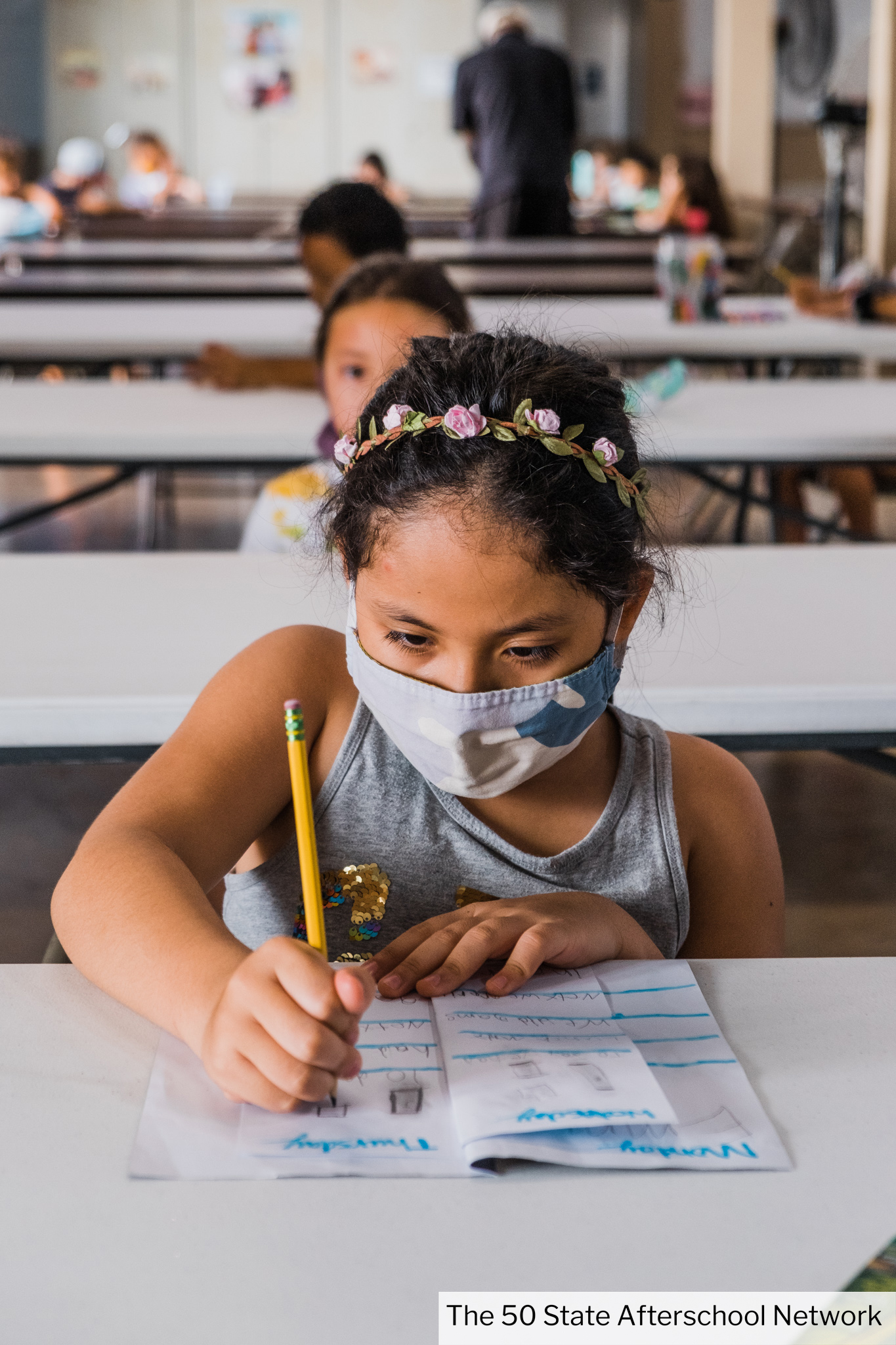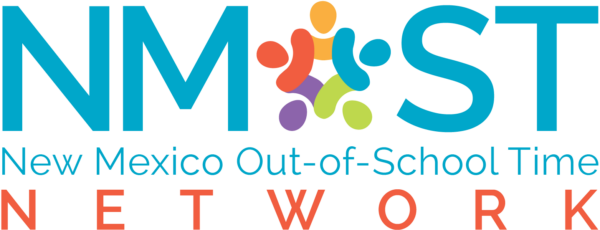About STEM
Why STEM in afterschool?
Nearly 80% of future careers will require some STEM skills. A stimulating STEM education is essential for developing the basic analytical, problem-solving and critical thinking skills central to academic achievement and workforce readiness in the 21st century.
Schools can’t tackle this issue by themselves. Children spend less than 20% of their waking hours in school. Afterschool programs offer both additional time and the opportunity to diversify the ways that students experience STEM learning.
Afterschool programs complement and supplement school-day learning and are well-positioned to engage and motivate participants. By offering innovative hands-on, project-based learning, STEM fields come alive for youth.

Programs
Explora: Each year, Explora facilitates more than 2,200 programs for over 70,000 people from all 33 New Mexico counties and from the surrounding states. Programs take place at Explora, at community sites, or virtually and can be offered in both English and Spanish.
The Native Health Initiative runs a number of programs including Healers of Tomorrow (HOT), which is an 8 month mentorship program dedicated to exploring health careers, providing college preparation, and developing leadership skills in motivated high school students
STEM Santa Fe runs a variety of programs including STEM Pathways for Girls: An inspiring monthly program dedicated for girls in 5th-8th grade. The program kicks off with an inspiring one-day conference for 200 girls, formerly known as Expanding your Horizons, usually on a Saturday in October/November. The conference is followed by 6 monthly in-depth workshops led by women in STEM.
Girls Inc. of Santa Fe is an affiliate of the national nonprofit youth organization, Girls Incorporated, dedicated to providing vital, innovative educational program to girls ages 5-18, particularly those who are underserved, face multiple intersectional challenges, or at risk of making unhealthy choices.
Girl Scouts of New Mexico Trails gain important skills in four areas that form the foundation of the Girl Scout Leadership Experience: Science, technology, engineering, and math (STEM), Outdoors, Life Skills, and Entrepreneurship
4‑H STEM and agriculture programs equip young people with the skills they need to succeed in life, and are available through local clubs, schools and grant-funded programs. Focus areas include computer science, robotics, environmental science, agri-science, financial literacy, entrepreneurship, and veterinary science.
Girls Who Code: Clubs are free after-school programs for 3rd-5th and 6th-12th grade girls to join our sisterhood of supportive peers and role models using computer science to change the world.
NM MESA: New Mexico Mathematics, Engineering, and Science Achievement is a pre-college program that prepares students for college and careers in mathematics, engineering, science or technically related fields. MESA students participate in a variety of enriched math, science and engineering activities including field trips, speakers, workshops, regional and state-wide academic competitions, community service and leadership development projects. NM MESA provides funding and logistical support for these and other activities.
Competitions
The New Mexico Supercomputing Challenge is an annual STEM competition designed to get local students interested in STEM fields, while also getting local tech firms interested in NM Students. Since 1990, the challenge has attracted hundreds of students from around New Mexico and produced some impressive results.
New Mexico STEM Competitions: New Mexico MESA’s excellent listing of STEM-related competitions in New Mexico.
Science Olympiad is nationwide competition. Students compete in 23 events that include earth science, biology, chemistry, physics, and engineering. Science Olympiad is designed to increase a student’s interest in STEM fields and provide recognition for outstanding achievement in team events. Students compete in Science Olympiad with the top teams advancing from Regional to State to National levels.
The New Mexico Science and Engineering Fair (NMSEF) accepts the top exhibits from the six regional science fairs in the state. It is held each late March and early April on the campus of New Mexico Institute of Mining and Technology (NMIMT) in Socorro.
Robo Rave is a Robotics Education program to teach students and teachers how to design, build, program and test robots to perform a variety of tasks. And an International Robotics Competition for teams of kids, ages 8 to adults, to test their design in one or more events. Our motto: “Today’s Play, Tomorrow’s Pay.”
Congressional App Challenge: Every year we challenge students in our districts to create and submit their original apps for a chance to win the Congressional App Challenge (CAC). Each challenge is district-specific. As U.S. Representatives we publicly recognize our winning teams and each winning app may be put on display in the U.S. Capitol Building for one year.
Makerspaces
A Makerspace is a learning environment rich with possibilities. As new hardware and software tools for making, digital design, and fabrication are emerging, we’re working together — with teachers and community leaders — to place those tools into the hands of a wider audience. We’re building the infrastructure for more kids and adults to connect to a future in which they can personally change, modify or “hack” the physical world, creating things that were nearly impossible to do on their own just a few years ago. Making is about getting hands-on, using these new technologies and basic tools, to do real and personally meaningful work.
We’re enabling new makers — and makers of makers — everywhere to create spaces, find the tools they need, and create the programs for the spaces. Our program has five elements:
Network
Get access to an open and collaborative network of educators and members of the worldwide maker community, all doing this work too. Share insight, ideas, and best practices from one Makerspace to another. Connect on a local level with makers on the ground and community partners who support making.
Project Library
Our flexible, modular projects introduce skills and allow new makers to filter projects based on their own interests, ability, and available equipment. These projects make it easy to get started and get better, and they’re backed up by all a facilitator needs to know to make the project work with a group.
Learning Lab
Maker Media and the greater Maker community have already generated a large body of content to bring new makers up to speed on making. We provide better ways for learners to discover and access relevant content.
Training + Support
How do you run a class in making? Engage students in projects? Create the right learning environment? Mix disciplines? We nurture a vibrant community of practice among Maker-educators with online workshops & hangouts and in-person professional development. These introduce new ideas and projects and provide ongoing feedback and support.
Tools (Hardware + Software)
Our pre-packaged kits reduce the barrier of creating a space. We’ve designed a basic “Makerspace in a Box” kit with the standard set of tools needed to complete skill-builder projects like simple chairs, soldering, soft circuitry, etc. Advanced kits would add 3D printers and other optional expansion modules.
Research
A Summary of Effective Gender Equitable Teaching Practices in Informal STEM Education Spaces
Women and girls, particularly women and girls of color, remain underrepresented in STEM disciplines. This underrepresentation begins as early as late elementary school age. Educators, particularly those in informal STEM education, can help address gender inequity in STEM by understanding how research can be translated into actionable strategies. This article summarizes research on gender equitable practices for middle school girls in the last decade and addresses the disconnect between research and practice by presenting the findings in a way that educators can immediately act on.
STEM Ready America is a compendium from 40 authors presenting bold and persuasive evidence—as well as real-world examples of effective practices, programs, and partnerships—on how science, technology, engineering and mathematics (STEM) knowledge and skills are preparing young people to be successful in school today and the workforce tomorrow.
ESSA STEM One-pager
Learning in science, technology, engineering and math (the subjects collectively known as STEM) helps students succeed in school and prepares them for careers that are driving global economic growth. Nationwide, states and schools are engaging diverse partners like afterschool programs, libraries, museums, universities, and businesses to ensure that students have access to high-quality STEM education. Download PDF
Unconscios Bias in the Classroom: Evidence and Opportunities
In partnership with Stanford University and the American University, Google conducted this literature review to explore the theories and evidence of unconscious bias, as relevant to education, as well as interventions to mitigate its effects, particularly for underrepresented students. We found:
- People consciously and unconsciously store experiences, and this process cannot be turned off and later influences automatic decision-making.
- Exposure to unconscious bias can influence stereotyped groups to conform to stereotypes, even when the stereotype was initially untrue.
- “Suppressing biases” is likely counterproductive; instead, interventions should encourage teachers to see students as individuals and build empathy and high expectations.
- Teachers and classroom climate moderate the impact of unconscious bias, suggesting that teacher-facing interventions have potential to improve student outcomes.
Tools
AFTERSCHOOL STEM Hub
Here, advocates for high-quality after school learning in science, technology, engineering and math (STEM) will discover the most effective ways to make the case for expanding and supporting afterschool STEM programs. Thanks to careful and extensive research performed by the FrameWorks Institute, a non-profit communications think tank, we have a solid understanding of average Americans’ perceptions about STEM learning and the out-of-school time environment, as well as reliable, tested ways of positioning afterschool STEM that can overcome any communication roadblocks. Read More
STEM Connector
STEMconnector®, a Diversified Search company, is a consortium of companies, nonprofit associations and professional societies, STEM-related research & policy organizations, government entities, universities and academic institutions concerned with STEM education and the future of human capital in the United States. STEMconnector® is both a resource and a service, designed to link “all things STEM” through a comprehensive website that connects national, state and local STEM entities. The STEMconnector® website contains profiles of more than 20 categories of STEM-related entities and details ‘Who is Doing What’ on over 6000 STEM-related organizations all 50 states. Read More
